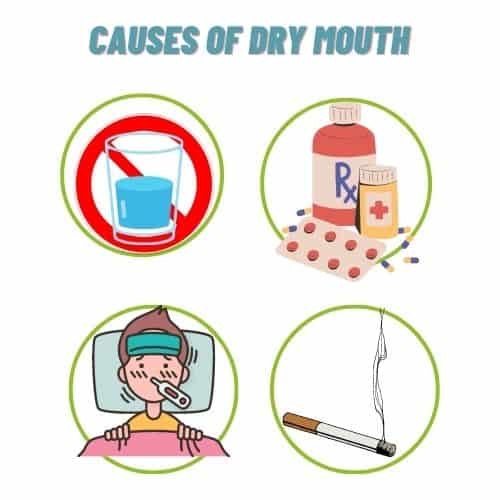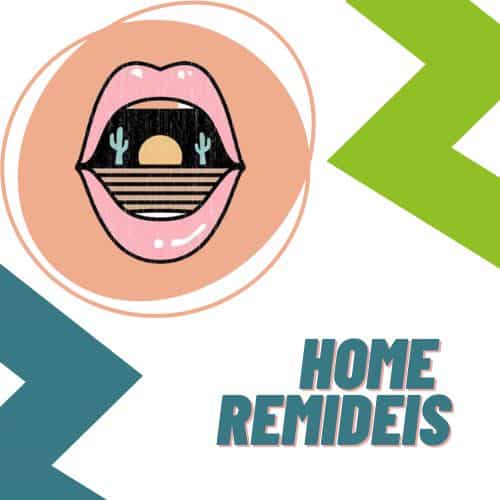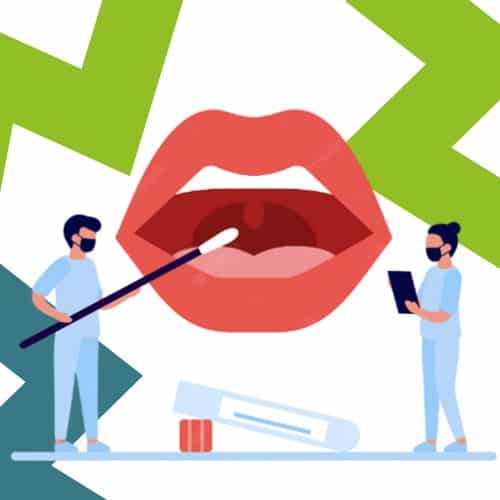If you wake up with a dry mouth and sore throat, you may be suffering from dry mouth. Up to 23% of individuals suffer from sleep-related dry mouth, which can leave your throat feeling parched and in need of a drink of water upon awakening. This may occur for several causes. Unfortunately, if nothing is done about it, it can also lead to bad dental health.
A dry mouth, also known as xerostomia, might be problematic since you are not making enough saliva to wash away debris and facilitate remineralization of your tooth enamel.
Causes of dry mouth
Whether a person experiences dry mouth during the day or night, a number of reasons can be to blame. Identifying the source of your dry mouth may help you determine how to treat and avoid future episodes.

1. Dehydration
If you find yourself awakening during the night feeling thirsty or with a dry mouth, you may be dehydrated. Dehydration happens when you drink less water than your body evacuates, either through urine or perspiration[1].
Dehydration is more likely to occur when you do not consume enough water or lose more fluids than usual. For instance, diarrhea or excessive perspiration due to activity or hot weather might lead to increased fluid loss. In certain instances, underlying medical conditions for example diabetes may contribute to dehydration.
2. Using the Mouth to Breathe
Nighttime dry mouth might be caused by breathing via your mouth instead of your nose[2]. Nighttime mouth breathing is linked to sleep-disordered breathing and can be caused by nasal obstruction. However, working with a physician or sleep professional can help an individual determine why they breathe through their mouth at night and how to address it.
3. Medicines and Medical Treatments
Numerous drugs have the potential to produce dry mouth as a side effect, in part because numerous drugs inhibit salivation. Taking many medications may also raise a person’s chance of developing a dry mouth[3]. Among the drugs that may cause dry mouth are: Antihistamines, Antidepressants, Diuretics, Decongestants, muscle relaxants, and Antipsychotics.
Other medications include bladder drugs that inhibit urination, drugs used to treat glaucoma, certain sedatives, drugs used to cure Parkinson’s disease or dementia, and asthmatic drugs.
Certain medical procedures may also result in dry mouth. A dry mouth is a typical side effect of head-and-neck radiation used to treat cancer. Additionally, the dry mouth has been linked to the use of “continuous Positive Airway Pressure” (CPAP) machine management for obstructive sleep apnea [4].
4. Illnesses
Dry mouth can occur as a symptom of or in combination with another physical health concern. For example, in Sjogren syndrome[5], which is an autoimmune condition, one of the key symptoms is a dry mouth. When diagnosing Sjogren syndrome, physicians frequently measure saliva flow and inspect salivary glands for abnormalities along with dry lips, Frequently, Sjogren syndrome causes dry eyes. while other body parts may experience dryness Less commonly.
Other medical disorders and illnesses might also be the reason for dry mouth. Some of these conditions include: “Obstructive sleep apnea”, “diabetes”, “COVID-19 Infection”, “human immunodeficiency virus” (HIV), elevated blood pressure, and Hepatitis C
5. Aging
Dry mouth is more prevalent among elderly persons. This could be the result of an increase in the usage of drugs that induce dry mouth.
6. Cigarette smoking
Cigarette smokers produce less saliva than nonsmokers due to the chemicals in cigarette smoke, which can result in an increase in dry mouth with time [6].
7. Biological Sex
Multiple studies have revealed that women are more likely to experience dry mouth [7]. This prevalence is not related to drug use, meaning it is not a result of more women taking medications. More research is required to properly comprehend this relationship.
Home Remedies To Treat A Dry Mouth

No matter what is causing dry mouth at night, the following home remedies can help: avoid drinking coffee or tea at night, smoking, and using tobacco products, which can dry out the mouth, should be avoided.
To make more saliva, you can chew sugar-free Gu or suck on sugar-free lozenges or hard candies, drinking lots of cool water throughout the day
Furthermore, people with dry mouths should take care of their teeth to reduce the chance of getting cavities. This means using fluoride toothpaste to brush your teeth two times a day and flossing every day.
People with very dry mouths may need to go to the dentist more often. This is to make sure that no cavities have formed.
Nighttime dry mouth is usually not a medical emergency. But in some cases, it may mean that you need to see a doctor. Additionally, if a person has any of the following, they should see a doctor: they have dry mouth, which is making it hard for them to sleep, dry mouth that hurts and makes you feel bad, and more cavities.
Additional Treatment Options To Treat Dry Mouth
There are different ways to treat dry mouth, depending on the cause.

1. Artificial Saliva
Research shows that saliva substitutes can help people who can’t get relief from dry mouth any other way. Artificial saliva, or “saliva substitutes”, are lubricants that usually come in the form of a mouth rinse or gel [8]. Some varieties of artificial saliva are more effective than others, therefore it may be good to consult a physician who is familiar with how the various types function.
2. Medication
The United States “Food and Drug Administration” has given the green light to two salivary stimulants that are meant to help people with certain medical conditions who have dry mouth. Some research also suggests that the medication amifostine, which is frequently administered to treat the side effects of chemotherapy, can minimize the dry mouth associated with radiation therapy. However, these medications may have adverse effects so talk to your doctor before you start taking anything new [9],
3. Acupuncture
Some doctors think that acupuncture could help treat dry mouth by causing the body to make more saliva, but more studies are required to affirm this theory.
Conclusion
Dry mouth at night can be caused by the normal drop in saliva production at night. But dry mouth at night can also be a sign of a sudden illness or a health problem that has been going on for a while.
People should go to the doctor if their dry mouth hurts or makes them feel bad, or if it affects their sleep or sense of well-being in general. A doctor will try to figure out what’s causing dry mouth and suggest the best way to treat it.
References
- https://www.merckmanuals.com/home/quick-facts-hormonal-and-metabolic-disorders/water-balance/dehydration
- Sano M, Sano S, Oka N, Yoshino K, Kato T. Increased oxygen load in the prefrontal cortex from mouth breathing: a vector-based near-infrared spectroscopy study. Neuroreport. 2013 Dec 4;24(17):935-40. doi: 10.1097/WNR.0000000000000008. PMID: 24169579; PMCID: PMC4047298.
- Wolff A, Joshi RK, Ekström J, Aframian D, Pedersen AM, Proctor G, Narayana N, Villa A, Sia YW, Aliko A, McGowan R, Kerr AR, Jensen SB, Vissink A, Dawes C. A Guide to Medications Inducing Salivary Gland Dysfunction, Xerostomia, and Subjective Sialorrhea: A Systematic Review Sponsored by the World Workshop on Oral Medicine VI. Drugs R D. 2017 Mar;17(1):1-28. doi: 10.1007/s40268-016-0153-9. PMID: 27853957; PMCID: PMC5318321.
- Pico-Orozco J, Carrasco-Llatas M, Silvestre FJ, Silvestre-Rangil J. Xerostomia in patients with sleep apnea-hypopnea syndrome: A prospective case-control study. J Clin Exp Dent. 2020 Aug 1;12(8):e708-e712. doi: 10.4317/jced.56593. PMID: 32913565; PMCID: PMC7474945.
- https://www.merckmanuals.com/professional/musculoskeletal-and-connective-tissue-disorders/autoimmune-rheumatic-disorders/sj%C3%B6gren-syndrome
- Niklander S, Veas L, Barrera C, Fuentes F, Chiappini G, Marshall M. Risk factors, hyposalivation and impact of xerostomia on oral health-related quality of life. Braz Oral Res. 2017 Jan 16;31:e14. doi: 10.1590/1807-3107BOR-2017.vol31.0014. PMID: 28099580.
- Rad M, Kakoie S, Niliye Brojeni F, Pourdamghan N. Effect of Long-term Smoking on Whole-mouth Salivary Flow Rate and Oral Health. J Dent Res Dent Clin Dent Prospects. 2010 Fall;4(4):110-4. doi: 10.5681/joddd.2010.028. Epub 2010 Dec 21. PMID: 23346336; PMCID: PMC3429961.
- Łysik D, Niemirowicz-Laskowska K, Bucki R, Tokajuk G, Mystkowska J. Artificial Saliva: Challenges and Future Perspectives for the Treatment of Xerostomia. Int J Mol Sci. 2019 Jun 29;20(13):3199. doi: 10.3390/ijms20133199. PMID: 31261876; PMCID: PMC6651665.
- Riley P, Glenny AM, Hua F, Worthington HV. Pharmacological interventions for preventing dry mouth and salivary gland dysfunction following radiotherapy. Cochrane Database Syst Rev. 2017 Jul 31;7(7):CD012744. doi: 10.1002/14651858.CD012744. PMID: 28759701; PMCID: PMC6483146.
